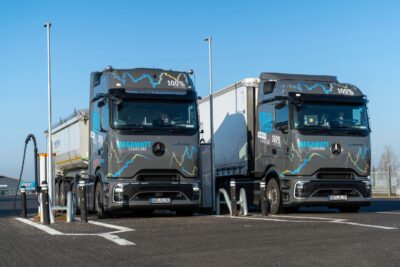From the mine to the port: CharIN reports on its progress
The Charging Interface Initiative (CharIN) has set itself the task of global standardisation of charging interfaces. The organisation is now providing information on the status of its activities in the field of megawatt charging systems, specifically in the areas of mining, maritime transport and air traffic. According to the association, significant progress is being made in the first two fields in particular, which will help to significantly reduce CO2 emissions in these industries.
Electrification in mining is gaining momentum, especially for dump trucks, which account for between 30 and 80 per cent of a mine’s energy requirements. CharIN is working with the mining association ICMM to develop uniform standards to harmonise the charging of heavy vehicles.
One of the most important results is the Dynamic Charging Interface, a concept for charging while vehicles are in motion. This reduces downtime and significantly increases efficiency in both open-cast and underground mining.
New charging standards for mining
It is complemented by two new megawatt charging systems: R-MCS, a particularly robust variant for extreme conditions, and X-MCS, which was developed for the largest and heaviest machines with particularly high energy requirements. Since dump trucks account for a large proportion of emissions in mining, their electrification is central to climate targets.
However, the industry faces technical and organisational challenges, such as charging infrastructure, the ability of different systems to work together, and the integration of electric vehicles into existing processes.
The Innovation for Cleaner, Safer Vehicles initiative brings together operators, manufacturers and technology partners to work on solutions to these problems. Joint pilot projects and uniform standards are intended to accelerate electrification, increase operational efficiency and pave the way for emission-free fleets in mining.
MCS connections for shipping
CharIN’s Marine Task Force is working to establish uniform CCS and MCS standards in the maritime sector as well. Building on the successful MCS Vessels project with Crowley, Black & Veatch and ABS, which was supported by the US Maritime Administration, it is currently defining the technical requirements for MCS-compatible shore power connections. These are intended to be able to supply battery-electric and hybrid ships while enabling a cost-efficient, globally scalable infrastructure.
The focus is on harmonising interfaces so that charging and shore power systems from different providers can work together seamlessly. To this end, the task force is working closely with shipyards, ports and energy suppliers and utilising existing technical foundations such as Ethernet 10Base-T1S to reduce development effort and costs. Standardised connections are considered key to lowering integration barriers and accelerating the expansion of maritime charging solutions.
In order to pool its efforts, the Marine Task Force has set up initial specialised subgroups – for example, for electrical safety, port electrification, deployment scenarios, communication, and testing and classification. These teams are working on the key technical and operational requirements and are tasked with specifically promoting the introduction of CCS and MCS standards in shipping.
The initiative is increasingly focusing on aviation
CharIN organises so-called Testivals to test and validate the Megawatt Charging System. Initially, these events focused primarily on testing controllers, but now they concentrate on fully integrated MCS systems in order to test interoperability, reliability and performance under real-world conditions.
In June 2025, comprehensive MCS tests for heavy commercial vehicles were successfully carried out in collaboration with Advantics, Scania and Stäubli. This represents a milestone for the initiative. Since then, MCS has been an integral part of CharIN’s interoperability tests, which will be further expanded at upcoming Testivals.
At the same time, CharIN is preparing to enter the aviation sector. With the advent of electrically powered VTOLs that can take off vertically, there is a growing need for standardised high-performance charging systems. CharIN aims to establish CCS and MCS as the global standard for aviation, close existing gaps in the standards and develop clear implementation guidelines to accelerate the introduction of electrified aviation applications. In doing so, the initiative aims to lay the foundations for an interoperable, scalable charging ecosystem.
This article was first published by Elias Holdenried for electrive’s German edition.





0 Comments